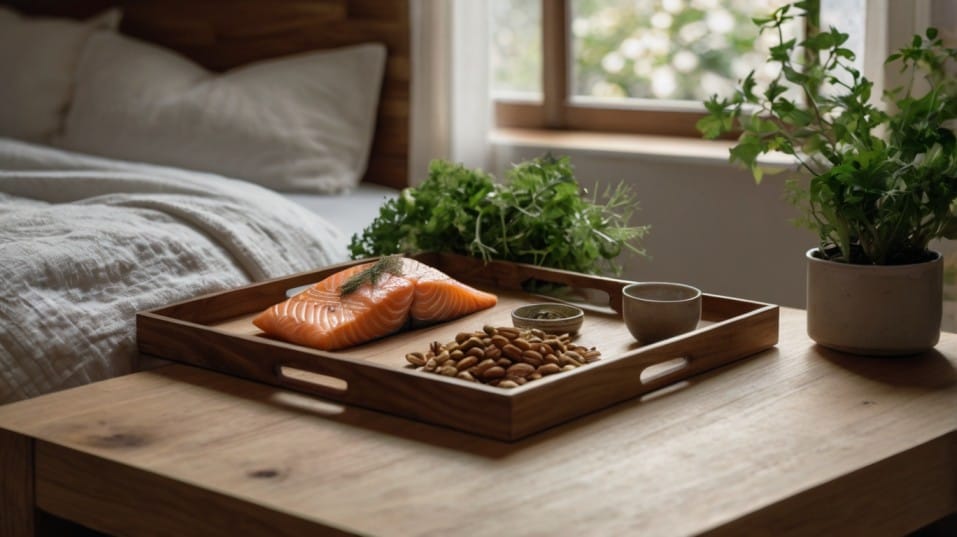Could Your Sleep Issues Be Linked to Your Diet?
Struggling with sleep? Your diet could be the missing link. Learn easy, science-backed tweaks to eat your way to better, deeper rest.

What if the real reason you’re not sleeping well isn’t in your bedtime routine—but in your fridge? You’ve tried the apps, the eye masks, the earlier lights-out. Still restless? It could be your food.
The link between what you eat and how you sleep is stronger than most people realize. From gut health to blood sugar swings, your diet could be quietly sabotaging your nights—and your energy the next day.
What You Eat Talks Directly to Your Brain
Your body isn’t a bunch of isolated systems—it’s one big, interconnected network. What you eat influences how your brain produces neurotransmitters, regulates hormones, and handles stress. All of these are major players in sleep.
Let’s start with serotonin. You’ve probably heard it called the “feel-good” chemical, but it also helps regulate your sleep-wake cycle. Most of your serotonin is made in the gut, not the brain.
So if your gut health is out of whack—thanks to low-fiber diets, artificial additives, or long-term inflammation—your brain isn’t getting the raw materials it needs to keep your sleep rhythms stable.
Here’s the takeaway: if you want better sleep, protect your gut.

What to Do:
Get in prebiotic fiber from foods like oats, onions, garlic, bananas, and asparagus. Make room for fermented foods like yogurt, kefir, or sauerkraut to support healthy bacteria.
And reduce the junk that throws your microbiome off—excess sugar, processed oils, and synthetic additives.
Your Last Meal of the Day Sets the Tone
Your evening meal can either be a launchpad into deep, restorative sleep—or a brick in your stomach that keeps your system working overtime while you're trying to power down.
Heavy, greasy, or late-night meals force your digestive system to stay active when it should be winding down. That can delay melatonin production, increase core body temperature, and trigger restlessness or shallow sleep.
What to Do:
Shift your focus to meals that are light but satisfying: lean protein, slow carbs, and healthy fats. Think grilled chicken with quinoa and roasted veggies, or a hearty salad with salmon and olive oil.
Give your body at least two to three hours between dinner and bed to finish the heavy lifting of digestion.
Blood Sugar Swings Can Ruin a Good Night
If you’re waking up in the middle of the night, there’s a good chance your blood sugar has something to do with it—even if you’re not diabetic or pre-diabetic.
Sharp spikes and crashes in glucose levels trigger a cortisol and adrenaline response, which can jolt you out of deep sleep or prevent you from getting there in the first place.
Many people unknowingly sabotage themselves with dinners that are carb-heavy and low in protein or fat.
A giant bowl of pasta, sushi rolls with white rice, or even a smoothie that’s all fruit and no fiber—these meals digest quickly, spike blood sugar, and leave you crashing just hours later.
What to Do:
Anchor your meals with protein and fat. These slow down digestion, stabilize blood sugar, and keep your energy more even—not just during the day, but overnight. Chicken, eggs, nuts, seeds, full-fat dairy, beans, and fish are all solid options.
You don’t have to cut carbs, just choose smarter ones: sweet potatoes, lentils, steel-cut oats, berries, and other fiber-rich picks.
Caffeine: It's Not Just About When You Fall Asleep
You might think, “I can have a coffee at 3 p.m. and still fall asleep by 10.” Sure—but the real question is, what kind of sleep are you getting?
Caffeine has a half-life of 5 to 7 hours, which means even a mid-afternoon pick-me-up can leave enough caffeine in your bloodstream to interfere with deep sleep phases.
You may not notice it at first, but over time you’ll feel it in your recovery, energy, and mood. Lighter sleep, fewer REM cycles, and more overnight wakeups can all stem from caffeine that’s still lingering in your system.
What to Do:
For better sleep quality, cut caffeine earlier—ideally before noon. And if you’re relying on it to prop yourself up after a poor night’s sleep, you’re just feeding the cycle.
Try scaling back for a week and notice the difference. More calm. Less wired. Deeper, more restorative sleep.
Are You Under-Eating Without Realizing It?
Here’s the twist most people miss: it’s not just what you eat that affects your sleep—it’s how much.
Chronic under-eating—whether from dieting, skipping meals, or being too busy to eat enough—puts your body in a subtle but persistent stress state. And your body doesn't prioritize deep sleep when it feels like resources are scarce.
Instead, it increases cortisol to keep you alert and on edge. That 3 a.m. wide-awake buzz? Could be your brain reacting to low fuel.
What to Do:
Your body needs a steady supply of nutrients and calories to feel safe enough to fully relax. That doesn’t mean eating late or overeating—it means fueling properly throughout the day so your nervous system isn’t fighting for survival after dark.
If you’re training hard, managing stress, or dealing with hormonal shifts, you may need more than you think. Listen to your hunger cues.
Eat enough protein. Don’t fear carbs—they’re your body’s preferred energy source, and they help produce serotonin too.
Micronutrients That Matter
Some specific nutrients are directly linked to sleep quality. If your diet is lacking in these, your sleep could suffer—even if everything else is in check.
What to Focus On:
- Magnesium: Helps regulate GABA, a calming neurotransmitter that promotes sleep. Found in almonds, spinach, pumpkin seeds, dark chocolate, and legumes.
- Vitamin B6: Involved in melatonin production. Found in bananas, chickpeas, and potatoes.
- Calcium: Works with magnesium and helps the brain use tryptophan to make melatonin. Found in dairy, leafy greens, and sesame seeds.
- Tryptophan: An amino acid that converts to serotonin. Found in turkey, eggs, oats, and dairy.
If you’re eating a variety of whole foods, you’re likely getting enough—but if you’ve been restricting food groups or relying on convenience snacks, a few simple upgrades could make a noticeable difference.
Final Thoughts
Sleep problems don’t always start in your bedroom. They often start in your blood sugar, your gut, your caffeine habits, or your food choices. The good news? Those are all things you can control.
Your diet either supports or disrupts your sleep—there’s no neutral zone. The smarter you eat, the smoother your sleep becomes. More energy, better recovery, sharper focus—it all starts with what’s on your plate.
So here’s the move: don’t overhaul everything overnight. Just start with your next meal. Add protein. Cut the junk. Fuel earlier. Watch what happens. Your sleep will thank you. Start now.




